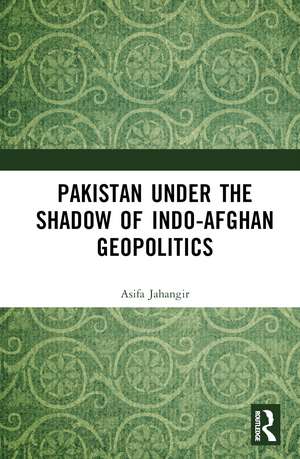Pakistan Under the Shadow of Indo-Afghan Geopolitics
Autor Asifa Jahangiren Limba Engleză Hardback – 26 dec 2024
A key intervention in South Asian geopolitics, this book will be indispensable for scholars of international relations, global politics, terrorism and counter-terrorism studies, strategic studies and military history.
Preț: 766.29 lei
Preț vechi: 1104.01 lei
-31% Nou
Puncte Express: 1149
Preț estimativ în valută:
146.63€ • 156.80$ • 122.26£
146.63€ • 156.80$ • 122.26£
Carte nepublicată încă
Doresc să fiu notificat când acest titlu va fi disponibil:
Se trimite...
Preluare comenzi: 021 569.72.76
Specificații
ISBN-13: 9781032152806
ISBN-10: 103215280X
Pagini: 272
Ilustrații: 24
Dimensiuni: 156 x 234 mm
Ediția:1
Editura: Taylor & Francis
Colecția Routledge India
Locul publicării:Oxford, United Kingdom
ISBN-10: 103215280X
Pagini: 272
Ilustrații: 24
Dimensiuni: 156 x 234 mm
Ediția:1
Editura: Taylor & Francis
Colecția Routledge India
Locul publicării:Oxford, United Kingdom
Public țintă
PostgraduateCuprins
1. Geopolitics of Afghanistan-India-Pakistan Triangular Relationship: Conceptual Framework of Unintended Consequences 2. Historical Roots: Orientalist Interpretations of Afghanistan and Indian Subcontinent 3. Unintended Consequences of the Grand Great Game in Afghanistan 4. Proxy Role of Pakistan and India in the Grand Great Game of Afghanistan 5. Pakistan-India Geopolitical Interests: Implication for Pakistan, 2002-2014 5. Conclusion
Recenzii
1. Ms. Asifa Jahangir has developed the idea of "unintended consequences" as a driving force in Indo-Pak-Afghanistan relations, as a process of foreign intervention in the history of Afghanistan, and as a conceptual framework for advancing knowledge about international relations. Through her careful reading of primary documents on the history and foreign relations of the region, she has developed an original and significant contribution to the existing IR literature.
Further, she has taken a critical re-thinking of the history of Afghanistan through the lens of Orientalism, critically questioning how historical tropes were produced and circulated by various powers (particularly the British in the colonial period and the United States in the postcolonial era) to advance their own interests. Rather than providing "objective" histories of the region, certain tropes were employed to sanction interventions by colonial and imperialist powers. Significantly, Ms. Jahangir shows how those tropes continue to be employed by Pakistan and India in waging their proxy war in Afghanistan today.
Dr. Chad Haines is Associate Professor at the School of Historical, Philosophical, & Religious Studies, Arizona State University, USA.
2. "Pakistan under the shadow of Indo-Afghan Geopolitics" delves into the intricate web of historical, political, and cultural ties that bind these three nations. This book explores how Afghanistan has navigated the complex dynamics of regional power struggles, influence, and conflict through meticulous research and compelling narratives. From the strategic manoeuvres of the Cold War to the ongoing quest for stability and peace, the book provides a nuanced understanding of Afghanistan's pivotal role in South Asian geopolitics. I fervently suggest reading this book.
Zafar Iqbal Yousafzai, author of The Troubled Triangle: US-Pakistan Relations Under the Taliban's Shadow (Routledge, 2022).
Further, she has taken a critical re-thinking of the history of Afghanistan through the lens of Orientalism, critically questioning how historical tropes were produced and circulated by various powers (particularly the British in the colonial period and the United States in the postcolonial era) to advance their own interests. Rather than providing "objective" histories of the region, certain tropes were employed to sanction interventions by colonial and imperialist powers. Significantly, Ms. Jahangir shows how those tropes continue to be employed by Pakistan and India in waging their proxy war in Afghanistan today.
Dr. Chad Haines is Associate Professor at the School of Historical, Philosophical, & Religious Studies, Arizona State University, USA.
2. "Pakistan under the shadow of Indo-Afghan Geopolitics" delves into the intricate web of historical, political, and cultural ties that bind these three nations. This book explores how Afghanistan has navigated the complex dynamics of regional power struggles, influence, and conflict through meticulous research and compelling narratives. From the strategic manoeuvres of the Cold War to the ongoing quest for stability and peace, the book provides a nuanced understanding of Afghanistan's pivotal role in South Asian geopolitics. I fervently suggest reading this book.
Zafar Iqbal Yousafzai, author of The Troubled Triangle: US-Pakistan Relations Under the Taliban's Shadow (Routledge, 2022).
Notă biografică
Asifa Jahangir is currently employed with EScience Press as the Chief Editor of the Journal of South Asian Studies. After completing her post-doctoral studies, she worked as an Assistant Professor in the Department of Political Science at Islamia Postgraduate College for Women in Lahore, Pakistan. She previously attended Arizona State University in the United States as an exchange doctorate scholar. Her areas of specialization include international relations, geopolitics, and Afghanistan. She has had multiple articles published in both domestic and foreign journals.
Descriere
The book examines the current geostrategic tussle in Afghanistan among different non-regional and regional players over control and manipulation of the region. This book will be indispensable for scholars of international relations, global politics, terrorism and counter-terrorism studies, strategic studies and military history.
